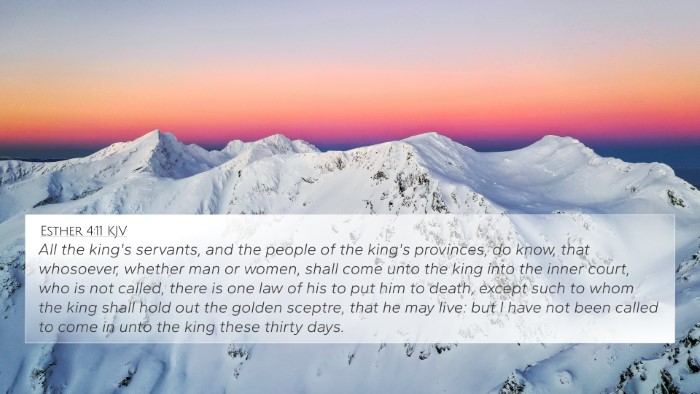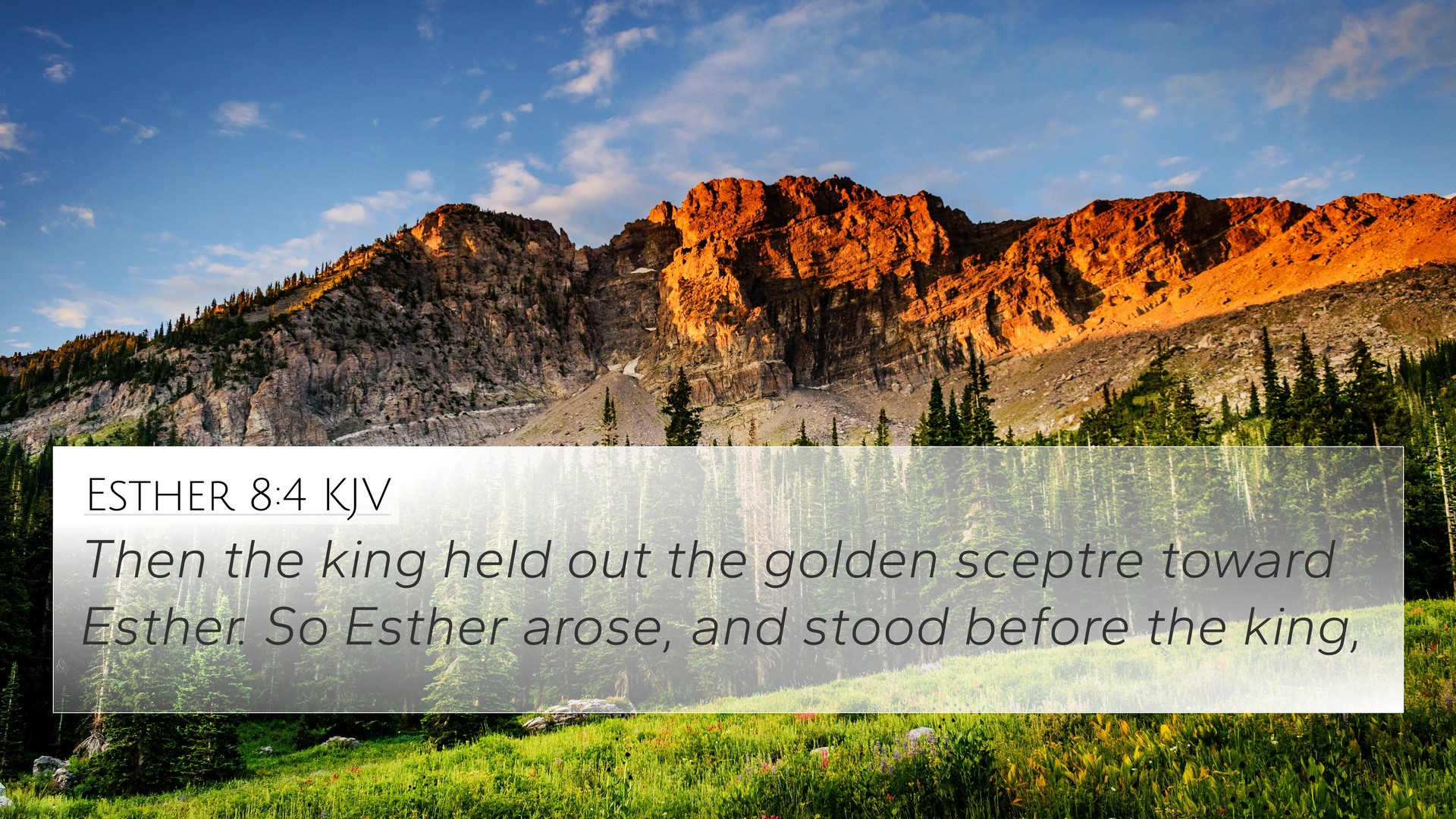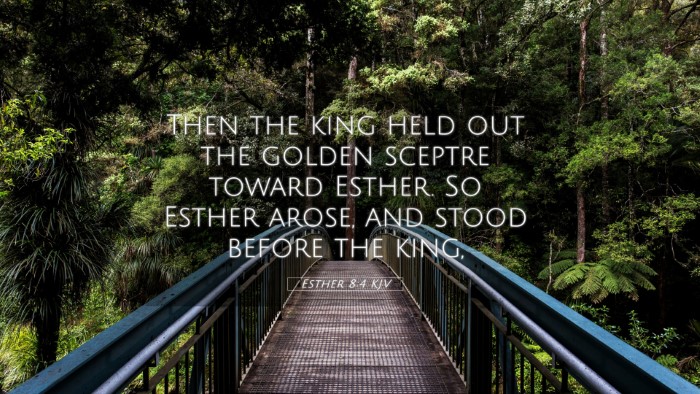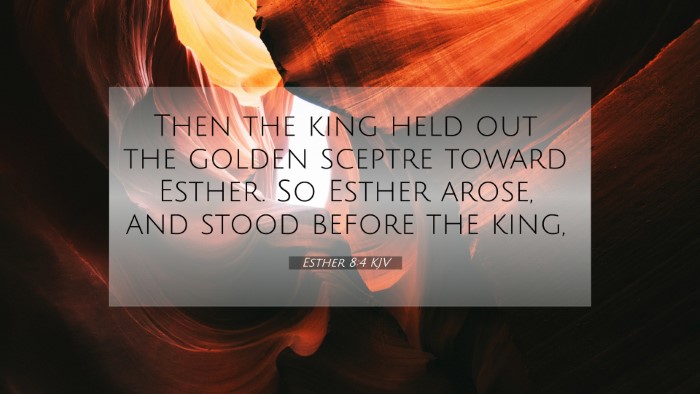Old Testament
Genesis Exodus Leviticus Numbers Deuteronomy Joshua Judges Ruth 1 Samuel 2 Samuel 1 Kings 2 Kings 1 Chronicles 2 Chronicles Ezra Nehemiah Esther Job Psalms Proverbs Ecclesiastes Song of Solomon Isaiah Jeremiah Lamentations Ezekiel Daniel Hosea Joel Amos Obadiah Jonah Micah Nahum Habakkuk Zephaniah Haggai Zechariah MalachiEsther 8:4 Similar Verses
Esther 8:4 Cross References
Then the king held out the golden sceptre toward Esther. So Esther arose, and stood before the king,
Uncover the Rich Themes and Topics of This Bible Verse
Listed below are the Bible themes associated with Esther 8:4. We invite you to explore each theme to gain deeper insights into the Scriptures.
Esther 8:4 Cross Reference Verses
This section features a detailed cross-reference designed to enrich your understanding of the Scriptures. Below, you will find carefully selected verses that echo the themes and teachings related to Esther 8:4 KJV. Click on any image to explore detailed analyses of related Bible verses and uncover deeper theological insights.

Esther 5:2 (KJV) »
And it was so, when the king saw Esther the queen standing in the court, that she obtained favour in his sight: and the king held out to Esther the golden sceptre that was in his hand. So Esther drew near, and touched the top of the sceptre.

Esther 4:11 (KJV) »
All the king's servants, and the people of the king's provinces, do know, that whosoever, whether man or women, shall come unto the king into the inner court, who is not called, there is one law of his to put him to death, except such to whom the king shall hold out the golden sceptre, that he may live: but I have not been called to come in unto the king these thirty days.
Esther 8:4 Verse Analysis and Similar Verses
Understanding Esther 8:4
This verse, nested in the narrative of Esther, captures a significant moment pertaining to the themes of justice, providence, and the reversal of fate. Here, Esther is asking the king to grant her request, reflecting her boldness and faith in the face of adversity.
Verse Context
Esther 8:4 reads: “Then the king held out the golden scepter toward Esther. So Esther arose and stood before the king.” This moment is crucial, revealing Esther's courage and the king's favor toward her. It sets the stage for the ensuing events that lead to the salvation of the Jewish people.
Biblical Commentary Insights
Multiple commentaries provide depth to this verse, demonstrating its rich theological implications:
-
Matthew Henry:
Henry emphasizes Esther's faith and the challenge she faced in approaching the king. His golden scepter symbolizes acceptance and favor.
-
Albert Barnes:
Barnes notes the significance of the golden scepter as a visual representation of the king's authority, and Esther’s courage in seeking help for her people.
-
Adam Clarke:
Clarke highlights the dramatic shift in Esther’s situation from fear to confidence, underscoring God’s providential hand in her actions.
Thematic Connections
This verse is tied to several important themes in the Bible:
-
Courage and Faith:
Esther’s bravery in addressing the king is a powerful lesson in faith and the willingness to risk for the sake of others.
-
Divine Providence:
The context of Esther’s request indicates God's hand in her situation, showing how He prepares His people for deliverance.
-
Justice and Retribution:
Esther’s plea represents a pursuit of justice against those who sought to oppress her people, emphasizing God's righteousness.
Bible Verse Cross-References
Several Bible verses relate to Esther 8:4, showcasing the rich intertextuality within Scripture:
- Esther 4:16: “Go, gather together all the Jews that are present in Shushan, and fast ye for me...” - A display of faith in action leading up to the king's court.
- Proverbs 21:1: “The king's heart is in the hand of the Lord, as the rivers of water: he turneth it whithersoever he will.” - Illustrates God's control over kings and rulers.
- Psalm 56:3-4: “What time I am afraid, I will trust in thee...” - Reflects the certainty of faith in fearful times.
- James 5:16: “The effectual fervent prayer of a righteous man availeth much.” - Emphasizes the power of prayer in seeking divine intervention.
- Hebrews 4:16: “Let us therefore come boldly unto the throne of grace...” - Encouragement to approach authority with faith.
- Romans 8:31: “If God be for us, who can be against us?” - A reminder of divine support amidst opposition.
- 1 Peter 5:7: “Casting all your care upon him; for he careth for you.” - Reinforces the concept of reliance on God.
Cross-Referencing Biblical Texts
When engaging with Esther 8:4, one can utilize various tools for Bible cross-referencing to enrich understanding:
- Bible Concordance: A tool to find specific verses related to key themes found in Esther.
- Bible Cross-Reference Guide: Useful for identifying verses that connect with Esther’s narrative.
- Cross-reference Bible Study: Engaging methods that utilize comparative analysis to draw connections.
- Bible Reference Resources: These can provide broader thematic insights alongside individual verses.
Conclusion
Esther 8:4 serves as a pivotal moment within the narrative of Esther, embodying themes of faith, courage, and divine intervention. By exploring the cross-references, readers can appreciate the verse’s broader theological implications and the connections between scripture passages. Understanding this verse within its context can bolster faith and encourage readers to see how God’s providence works in human affairs.
SEO Keywords Integration
This exposition encompasses insights from public domain commentaries and utilizes strategic keywords to optimize search results related to:
- Bible verse cross-references
- Connections between Bible verses
- Cross-referencing Biblical texts
- Comparative Bible verse analysis
- Bible verses that relate to each other
- Linking Bible scriptures


